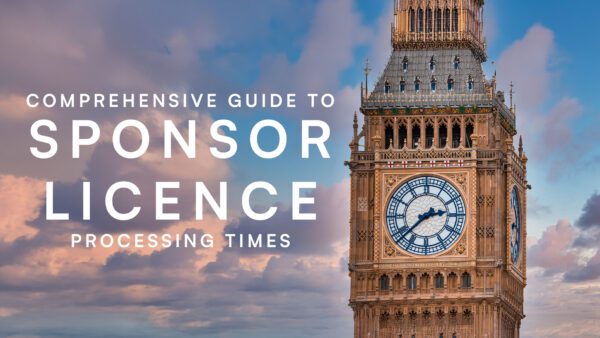Latest Posts

Self-Sponsorship Visas: A Pathway for Entrepreneurs to Establish a UK Presence
The UK remains an attractive destination for entrepreneurs seeking to establish and expand their businesses. However, with the closure of the Tier 1 (Entrepreneur) visa and the restrictive requirements of other business immigration routes, many aspiring business owners face challenges in securing a viable immigration pathway.
Self-sponsorship has emerged as a strategic alternative, allowing entrepreneurs to set up and operate a business in the UK, providing long-term stability and growth opportunities.
At Quastels, we advise entrepreneurs on navigating the complexities of self-sponsorship, ensuring that both immigration and business compliance requirements are met.
Understanding Self-Sponsorship
Self-sponsorship enables an entrepreneur to establish a UK company, obtain a Sponsor Licence, and sponsor themselves for a Skilled Worker visa. Unlike traditional visa routes, self-sponsorship does not require:
- A third-party employer to act as a sponsor
- A fixed investment amount, as required for the Innovator Founder visa
- An endorsement from a UK government body or business accelerator.
Instead, this route provides greater flexibility, allowing business owners to take control of their own immigration status while actively managing their company.
Who is Eligible for Self-Sponsorship?
To successfully secure a self-sponsored visa, an entrepreneur must meet key criteria across three areas:
1. Business Viability and Sponsor Licence
- The applicant must establish a genuine UK business that can sponsor skilled workers.
- The business must obtain a Sponsor Licence from the Home Office.
- A credible business plan and operational structure must be in place.
2. Skilled Worker Visa Requirements
- The applicant must hold a skilled role within their business (e.g., Director or CEO).
- The role must meet the minimum salary threshold.
- The applicant must demonstrate English language proficiency at CEFR Level B1 or equivalent.
3. Financial and Operational Readiness
- The business must be financially viable, with the capacity to pay salaries.
- The applicant must show the business has commercial potential and can contribute to the UK economy.
The Self-Sponsorship Process: Step by Step
1. Establishing a UK Business
The first step in self-sponsorship is registering a UK company with Companies House. The business must have:
- A defined commercial purpose and structured business plan
- A UK-based office address
- A UK-resident Director, which can be the applicant or another individual
2. Applying for a Sponsor Licence
To sponsor themselves, the entrepreneur must apply for a Sponsor Licence. The Home Office assesses whether the company:
- Has a genuine need for skilled workers
- Is financially stable and compliant with UK employment laws
- Has appropriate HR and compliance systems in place
A robust business plan and supporting financial documentation are crucial at this stage.
3. Assigning a Certificate of Sponsorship (CoS)
Once the Sponsor Licence is granted, the business can assign a Certificate of Sponsorship (CoS) to the entrepreneur. This document is required for the Skilled Worker visa application and must include:
- The job title and salary
- A description of the role and responsibilities
- Confirmation that the role meets the required skill level
4. Applying for the Skilled Worker Visa
With the CoS in place, the entrepreneur can apply for a Skilled Worker visa. The application typically requires:
- Proof of English language proficiency
- Financial evidence demonstrating the business’s sustainability
- Supporting documents confirming business ownership and sponsorship status
If successful, the applicant is granted a Skilled Worker visa for up to five years, with the possibility of applying for Indefinite Leave to Remain (ILR) thereafter.
Advantages of Self-Sponsorship
- Greater Control and Flexibility
- Unlike traditional employment-based sponsorship, self-sponsorship allows entrepreneurs to establish and lead their own business without being dependent on an external employer.
- No Fixed Investment Required
- Unlike the Innovator Founder visa, which requires a minimum £50,000 investment and endorsement, self-sponsorship does not impose a pre-set investment threshold.
- Pathway to Settlement
- After five years under a Skilled Worker Visa, self-sponsored entrepreneurs can apply for Indefinite Leave to Remain (ILR), offering long-term security in the UK.
- Expansion and Growth Opportunities
- Once established, the business can sponsor additional skilled workers, enabling further expansion and development.
Challenges and Considerations
- Sponsorship Compliance
- The Home Office imposes strict compliance requirements for businesses holding a Sponsor Licence. Entrepreneurs must ensure they meet reporting, record-keeping, and employment obligations to maintain their sponsorship status.
- Genuine Business Requirement
- The business must be actively trading and demonstrate a genuine commercial need for skilled workers. The Home Office closely scrutinises applications to prevent misuse of the visa system.
- Ongoing Visa and Tax Obligations
- Entrepreneurs must comply with UK tax regulations, employment laws, and immigration rules to sustain their business and visa status.
How Quastels Can Assist
At Quastels, we offer tailored legal support to entrepreneurs navigating the self-sponsorship route. Our services include:
- Advice on structuring and registering a UK business for immigration purposes
- Assistance with Sponsor Licence applications and compliance requirements
- Skilled Worker visa application management and strategic guidance
- Ongoing support to ensure business and immigration law compliance
With extensive experience in both business and immigration law, we help clients secure their UK presence while ensuring regulatory compliance.
Conclusion
Self-sponsorship offers a flexible and structured pathway for entrepreneurs to establish and expand a business in the UK. By obtaining a Sponsor Licence and securing a Skilled Worker visa, business owners can take control of their immigration status while contributing to the UK economy.
Given the complexities of the application process, expert legal guidance is essential to ensure compliance and maximise the chances of success. At Quastels, we provide comprehensive support to entrepreneurs at every stage of their self-sponsorship journey.
Read More
An 8-Step Guide to the Conveyancing Process for Buyers
For first-time buyers and seasoned property owners, the conveyancing process can be rather daunting and complex. This 8-step guide to the conveyancing process explains the key steps of purchasing a property, from instructing a solicitor, through to completion.
Step 1: Instructing a Solicitor
a) Once your offer has been accepted on a property, your first step is to instruct a property solicitor. Choosing the right solicitor is essential for a smooth, stress-free transaction.
b) When making your decision, you may wish to consider several factors such as online reviews, whether the solicitor is fully qualified, and if the firm is on your mortgage lender’s panel. It can also be beneficial to choose a local firm familiar with the area’s property market.
c) Capacity, timescales, and whether the solicitor is part of the Law Society Conveyancing Quality Scheme (CQS) are also important considerations. CQS accreditation demonstrates a firm’s ability to provide residential conveyancing advice to the standards expected by clients, lenders, and the residential conveyancing community. At Quastels, we are proud to have secured membership to the Law Society’s Conveyancing Quality Scheme.
d) Once you have chosen your solicitor, the firm will provide you with a cost estimate. Upon agreement, you will receive a confirmation letter along with documents to sign, officially instructing them to begin the legal process. Your solicitor will request identification documents, proof of funds, and money on account to cover third-party disbursements such as property searches.
Step 2: Arranging a Mortgage (if required)
a) If you require a mortgage, you should apply for this once your offer is accepted.
b) You can arrange this directly with a bank, building society, or through a mortgage broker. Many buyers opt for a broker to help streamline the process by comparing options across the market.
c) Once you receive your mortgage offer, you must provide a copy to your solicitor so they can ensure all lender requirements are satisfied.
Step 3: Property Survey
a) When purchasing a property, the principle of “buyer beware” applies. This means that you are responsible for identifying any potential issues with the property’s condition. A solicitor cannot advise on the physical aspects of the property, as they do not physically inspect the property.
b) A survey is not mandatory, but it can provide valuable insight into the property’s condition. Surveys range in cost from around £350 to £2,000 and typically take between two and four weeks.
c) Conducted by a professional chartered surveyor, a survey highlights structural issues or necessary repairs. If any concerns arise, you may wish to obtain specialist quotes for repairs and use this information to renegotiate the purchase price if necessary. For example, if the property needs an electrical rewire which is going to coast £4,000, you may wish to consider asking the seller to reduce the price of the property accordingly.
Step 4: Property Searches
Property searches are enquiries with public authorities to give you more information about the property you intend to buy. A variety of searches may be required, but the mandatory searches you must obtain if you require a mortgage include:
- Local Authority Search– Provides details about planning permissions, building regulations, conservation areas, road access, and any enforcement notices affecting the property.
- Environmental Search– Reveals environmental risks such as flooding, ground subsidence, contamination, energy, and nearby infrastructure projects.
- Water and Drainage Search– Confirms whether the property is connected to mains water and drainage.
Step 5: Preparing for Exchange of Contracts
a) Once your solicitor receives your search results, survey, mortgage offer, and all relevant sale documents from the seller, they will prepare a ‘Report on Title.’ This report summarises the key legal details of the property, the contract, the lease (if applicable), and the search results. Your solicitor will highlight any areas of concern.
b) Once you are satisfied with the report, you will be asked to sign the contract and transfer the deposit, which is typically 10% of the purchase price unless otherwise agreed.
c) Both you and the seller will agree on a completion date.
Step 6: Exchange of Contracts
a) Your solicitor will proceed to exchange of contracts, once they hold your 10% deposit, signed contract, mortgage offer (if applicable) and instructions from you to proceed.
b) On exchange of contracts, the completion date is agreed and the contract becomes legally binding.
c) Your solicitor will request the mortgage advance (if applicable) in good time for completion.
d) Your solicitor will prepare a final completion statement and invoice showing the total funds required for completion, including Stamp Duty Land Tax, legal fees, Land Registry fees, and the balance of the purchase price.
Step 7: Completion
a) On the completion date, your solicitor will transfer the purchase funds to the seller’s solicitor.
b) The seller’s solicitor will then redeem any outstanding mortgage, pay the estate agent and their own legal fees, and transfer the balance to the seller.
c) Once funds are received, the seller’s solicitor will authorise the release of the keys, which can be collected from the estate agent.
Step 8: Post-Completion
a) Following completion, your solicitor will submit an application to the Land Registry to register the property in your name.
b) Once registration is complete, the Land Registry will update the title into your name reflecting your ownership.
c) Your solicitor will also arrange the submission of your Stamp Duty Land Tax payment to HMRC.
d) If the property is leasehold, a Notice of Transfer will be served on the landlord or managing agent to officially update you as the new owner.
If you require conveyancing services, please complete the form below to get in touch with our Residential Real Estate team.
Read More
A Comprehensive Guide to Sponsor Licence Processing Times and Priority Services for UK Employers
Securing a sponsor licence is a critical step for UK businesses seeking to employ skilled workers. Understanding the processing times and available priority services is crucial for employers aiming to make a smooth application and use the Sponsorship Management System (SMS) efficiently.
Below is a comprehensive overview of the processing times for Skilled Worker Sponsor Licence applications, as well as the post-licence procedures for making amendments to sponsorship details. Understanding these timelines and options is crucial for ensuring a smooth application process and the efficient use of the Sponsorship Management System (SMS).
Sponsor Licence Applications
Upon submission of a sponsor licence application online, businesses must ensure that all required supporting documents are provided electronically to the Home Office within five working days.
- Standard Sponsor Licence: Typically, a decision is made within 6-8 weeks from the submission of the application. However, the processing time may be extended depending on the complexity of the application or the need for further checks.
- Priority Service: The Home Office offers an expedited processing service for an additional fee of £500. This service aims to process applications within 10 working days. While the service provides a faster turnaround, it is important to note that this timeframe is not guaranteed and is subject to capacity and processing demands.
- Certificate of Sponsorship (CoS) Application: After obtaining the sponsor licence, employers will need to apply for a Certificate of Sponsorship (CoS) for the proposed worker. A standard CoS application is processed within one working day. A Defined CoS (DCoS) generally takes up to one week, though this may be extended if additional checks or information are required by the Home Office.
- Skilled Worker Visa Application: For Skilled Workers, visa applications are generally processed within 15 working days for applications made outside the UK. For in-country applicants, processing time generally takes up to 8 weeks. Priority services are available to expedite this process.
Previously, securing a priority slot was highly competitive, with applicants needing to log in at precisely 08:59 am each weekday to secure one of the limited 30 day priority slots. However, the Home Office has since removed the reference to this fixed daily cap, possibly indicating that there may no longer be a set limit on the number of available priority slots. This remains subject to formal confirmation.
In my experience, securing a sponsor licence and successfully obtaining a Skilled Worker visa can be completed in as little as one to two weeks, particularly when utilising the priority service.
Once granted, a sponsor licence remains valid, provided the business continues to meet all regulations.
Post-Licence Applications
Following the issuance of a sponsor licence, businesses may need to make amendments to their sponsorship details. The priority change of circumstances service allows sponsors to fast-track certain post-licence requests, ensuring that modifications are processed efficiently.
Eligible Requests for Post-Licence Priority Service:
- Allocation of an additional Certificate of Sponsorship (CoS)
- Annual Certificate of Sponsorship (CoS) allocation
- Adding or changing a Level 1 user
- Replacing or amending the Authorising Officer (AO)
- Replacing or amending the Key Contact (KC)
- Adding a representative
- Amending organisational details (e.g. relocation to new premises)
Priority Service:
- Priority Service operates Monday to Friday, from 7:00 am to 5:00 pm.
- A fee of £200 applies for each request.
- A maximum of 100 priority service requests will be accepted each day. Any amendments to the limit will be communicated through the SMS message board.
If a request is accepted, the applicant will receive an email notification and must complete payment within 72 hours. The processing period for the request will begin on the next working day following the payment confirmation. Generally, the Home office will process the request within five working days. However, should the request be deemed complex or require further verification, the processing time may extend beyond the standard five-day period. In such cases, the Authorising Officer will be notified via email.
Conclusion
For businesses applying for a sponsor licence or making amendments to an existing licence, understanding the processing times and priority service options is essential. While the enhanced pre-licence service and post-licence priority service can expedite decisions, it is important to recognise that availability and response times are contingent on UKVI’s capacity. Employers must remain vigilant and stay informed of any updates from the Home Office to ensure smooth navigation through the sponsorship system.
If you require guidance for a sponsor licence application, contact our corporate immigration team using the form below.
Read More